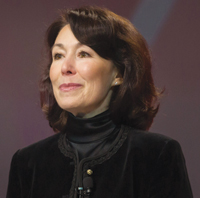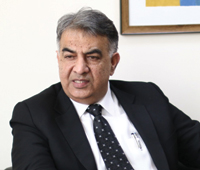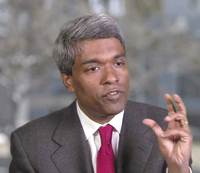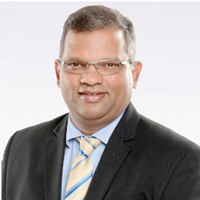Oracle Open World 2017
2017-05-25
To complement the future of India’s new digital economy and to address across the segments, which can work together to transform India digitally, Oracle announced the ERP Cloud that will enable Indian firms to administer and leverage the significant GST process changes -
 Safra A Catz
Safra A Catz
EO- ORACLE
“Oracle open world in India is a global conference organised in New Delhi. It, in a way complements honourable PM Narendra Modi ‘vision and the spirit of transforming this country and bring massive opportunity for over billion people. We are truly an integrated American-Indian company, and that gives me great joy. We have been in India for decades since 1987. When I joined Oracle 18 years ago, we had 40k people in our entire company and now we have nearly 40k here in India alone. Oracle has 90k centres and many-many offices; we have 2 offices just in Maharashtra state, both in Mumbai and Pune. Our entire financial services operation is based out of Mumbai. It is an honour to be the partner for this digital transformation in India.”
Safra further spoke on how Oracle is a clear leader in the cloud and its cloud journey started 20 years ago after acquiring Peoplesoft. “We have created ERP cloud for India and are launching cloud for India compliant for GST immediately. It clearly shows to you our commitment to India, developed just like the honourable PM want to make in India.”
Sparking Digital Transformation within an Organization...
Oracle’s Enterprise Resource Planning (ERP) Cloud in India will help enterprises (SME, local and multinational firms) operating in India prepare for the country’s transformational tax reforms. Oracle ERP Cloud delivers built-in features to facilitate compliance with new Goods and Services Tax (GST) regulations, provides native support for GST Network integration and reporting, and support for local requirements including withholding, payment processing, and statutory reporting.
To help customers successfully manage this transformation, trained and certified Oracle ERP Cloud consultants from Oracle partners, including Clover Infotech, Deloitte, Filix Consulting, KPIT, KPMG, and PWC are currently engaged with customers. Oracle ERP Cloud is a complete, modern, and proven financial platform delivered seamlessly through the Oracle Cloud. A modern user interface driven by the latest design innovations deliver embedded analytics, contextual social collaboration and a device-independent mobile experience that makes Oracle ERP Cloud familiar and easy to use.
 “Across India, a cultural and technological revolution is taking place. Together with government and local enterprise, Oracle is helping build India’s new digital economy. Discover how digital transformation can provide exciting opportunities for your organization,” said Shailender Kumar, Managing Director, Oracle India.
“Across India, a cultural and technological revolution is taking place. Together with government and local enterprise, Oracle is helping build India’s new digital economy. Discover how digital transformation can provide exciting opportunities for your organization,” said Shailender Kumar, Managing Director, Oracle India.
“We are in an era of disruption and simplification. Leading organizations are using enabling technologies like cloud, artificial intelligence and robotics to disrupt their thinking and transform operations, analytics, customer experience and more. Government agencies and commercial enterprises that are able to harness the possibilities of these technologies will be better positioned to shape the future of their organizations,” said Rakesh Barik, Partner & consulting technology leader, Deloitte India.
He further spoke on how digital transformation has the power to turbocharge the enterprise and learn about the dexterity. “Vision executives will need to thrive amid ongoing technology-fuelled disruption. Secondly, successfully evolving is the difference between failing or flourishing in digital age,” Rakesh said.
 Speaking on disrupting digital business, Ray Wang, Principal Analyst and Founder, Constellation Research stated that 55% of the Fortune 500 have been merged, acquired, gone bankrupt, or fallen off the list since 2000. This impact of digital disruption is real. However, it’s not the technologies that drive this change. It’s a shift in how new business models are created. “Discover which technology trends have had the biggest impact on digital transformation, Challenge on how to overcome obstacles to embracing new technology as the change-agent within your own organization,” Ray said.
Speaking on disrupting digital business, Ray Wang, Principal Analyst and Founder, Constellation Research stated that 55% of the Fortune 500 have been merged, acquired, gone bankrupt, or fallen off the list since 2000. This impact of digital disruption is real. However, it’s not the technologies that drive this change. It’s a shift in how new business models are created. “Discover which technology trends have had the biggest impact on digital transformation, Challenge on how to overcome obstacles to embracing new technology as the change-agent within your own organization,” Ray said.
Oracle announces datacenter plans for India
Oracle aims to provide customers the capability to build and move workloads to an India-based cloud. With this announcement of its cloud services in India over the next six to nine months, Oracle will be reviewing proposals from government and business partners to provide customers with the capability to build and move workloads to an India-based cloud. The services will offer uncompromised security and performance at a significant price advantage over both existing on-premises infrastructure and competitive cloud offerings. Oracle’s expanded infrastructure footprint is a result of tremendous customer demand.
 “Our customers and partners in India have trusted their businesses and mission-critical workloads to the Oracle Cloud for years,” said Thomas Kurian, president of product development, Oracle. “With this expansion we will be able to further support customer choice adding to capabilities already available through deployments of Oracle Cloud at Customer, as well as other Oracle Cloud data center regions in Asia Pacific.”
“Our customers and partners in India have trusted their businesses and mission-critical workloads to the Oracle Cloud for years,” said Thomas Kurian, president of product development, Oracle. “With this expansion we will be able to further support customer choice adding to capabilities already available through deployments of Oracle Cloud at Customer, as well as other Oracle Cloud data center regions in Asia Pacific.”
Oracle enables Customers to Drive Business Transformation
Oracle also expanded Oracle Cloud Platform’s integration offerings with the availability of Oracle API Platform Cloud Service. Bringing together leading API-first design and governance capabilities from recently acquired Apiary and API management from Oracle, the new cloud service delivers end-to-end capabilities for designing, prototyping, documenting, testing, and managing the proliferation of critical APIs. Through a completely new and simplified API management experience, users can easily support changing business demands while having clear visibility into who is using APIs for better control, security, and monetization of digital assets.
Part of the Oracle Cloud Platform, Oracle API Platform Cloud Service is designed to eliminate the complexities associated with transforming on-premises API solutions into the cloud, so companies can thrive in the digital economy. Users can grant external developers and partners access to data locked behind firewalls, inside applications, and within data stores, enabling them to power a larger community to innovate and develop new monetization strategies. It also empowers developers to manage different interfaces for a variety of audiences using advanced, but easy-to-use, API management capabilities.
Mrutanjay Mahapatra, DMD & CIO- SBI
 In a Fireside chat session with Mrutanjay Mahapatra, he talked about how as one of the oldest financial institutions SBI is transforming itself digitally -
In a Fireside chat session with Mrutanjay Mahapatra, he talked about how as one of the oldest financial institutions SBI is transforming itself digitally -
“I congratulate Safra, for announcing this grand programme in India. Speaking about the digital, today digital is no more choice it is inevitable; irrespective of your size, irrespective of where you are, you must go digital. We only expect that world will be judging India by what SBI does. So in this, we are digitising our front office, back office, customer experience and a host of other things. Thanks to partners like you and when I speak to seniors in oracle, I always say that it is not important what the world does, it is important what we can do together to show to the world that what India can do. So, in that spirit we know we are bringing the spirit of entrepreneurship. We have this impression that being a govt organisation, we may advance slowly but we will move surely and we will move well, so this is our move towards digitisation.
Secondly, SBI as the country’s largest bank was required to implement government policies. Let me tell you we have prepared a list of data analytics and that can developed to reach out government coarse currency in a matter of hours. We have the capability to work in an agile fashion and also we can tell how many people in red colour shirt have deposited more than 10k in a branch, that is the power of analytics and also. Also we did a lot of forecasting during demonetization drive because it was massive movement of cash that was happening. We did forecast, analytics and we did design development.”
 Replying on how technology has helped SBI to be the No.1 digital bank by moving from 100s of years of history to being at the forefront of the digital economy, he said, “it is simply madness behind the method, every method must have some madness or some kind of a mission behind whatever you do. I call it a STEP approach. S is security and TEP is transformation practice. Every year you are likely to see a transformed SBI. So what is our transformation preparedness? Every time, when I meet my senior colleague members or when I meet with partners like you, because there are so many things going on, we are sometimes lost in the crowd of when we talk about, how to give digital experience to consumers and so on. What is happening today is B2B transformation and G2C transformation, where a huge amount of intermediation is required; human practice is required on the part of the banks. So you need to be ready for the transformation. We are bringing a large number of changes in our processes, people and the technology together and also of course at the end productivity. Your IT must bring us adequate return of investment, and also we should know how to measure it because if we don’t measure it we will lose it.
Replying on how technology has helped SBI to be the No.1 digital bank by moving from 100s of years of history to being at the forefront of the digital economy, he said, “it is simply madness behind the method, every method must have some madness or some kind of a mission behind whatever you do. I call it a STEP approach. S is security and TEP is transformation practice. Every year you are likely to see a transformed SBI. So what is our transformation preparedness? Every time, when I meet my senior colleague members or when I meet with partners like you, because there are so many things going on, we are sometimes lost in the crowd of when we talk about, how to give digital experience to consumers and so on. What is happening today is B2B transformation and G2C transformation, where a huge amount of intermediation is required; human practice is required on the part of the banks. So you need to be ready for the transformation. We are bringing a large number of changes in our processes, people and the technology together and also of course at the end productivity. Your IT must bring us adequate return of investment, and also we should know how to measure it because if we don’t measure it we will lose it.
 Speaking on connecting to customers, well I always tell that we have to run the speed at the same pace. The ecosystem is changing at the same time that you are changing, so it is a 2 dimensional thing to begin with, and becomes multidimensional in no time. We really do lots of collaboration - one is customer collaboration, where we have the groups of customers who work in my source or in my crowd/cloud of ideas. They tell me what they like and what they don’t like. If something is not working probably 5 years back, SBI would have remained stuck to that. But today I am willing to retire a sunset product in 3 months time and also at the same time we are also going and collaborating with the fintech companies, with the start-ups. We are employing our entrepreneur skills by telling that mobile should be first.
Speaking on connecting to customers, well I always tell that we have to run the speed at the same pace. The ecosystem is changing at the same time that you are changing, so it is a 2 dimensional thing to begin with, and becomes multidimensional in no time. We really do lots of collaboration - one is customer collaboration, where we have the groups of customers who work in my source or in my crowd/cloud of ideas. They tell me what they like and what they don’t like. If something is not working probably 5 years back, SBI would have remained stuck to that. But today I am willing to retire a sunset product in 3 months time and also at the same time we are also going and collaborating with the fintech companies, with the start-ups. We are employing our entrepreneur skills by telling that mobile should be first.
Secondly, we have 117 thousand employees after we did one of the largest mergers in banking history in the world and all these people I always see like my customers, who are in the age of 18 to 108 and who want completely digital delivery to completely assistant delivery. I have employees in all shapes and sizes. There are employees among them, someone who is digital savvy or someone who believes that computer is something which he doesn’t want to know. So here what is required is that, how we take people along at the time of crisis to tell them what is in need from them, how they are making a difference and that the orchestration requires your ability."
Munish Mittal, Group Head-IT & CIO- HDFC Bank
 “HDFC Bank is now the country’s second largest private sector lender. Banking is a technology business and CIO brings technology skills. We are in the business of making money by moving money. Banks are the only merchants who want their products back. If we lend money, we want it back. Our core business is banking and technology as a platform offers it to the customers in a more sophisticated, more accurate and faster manner, to give a better experience to our customers. This experience which they will carry and continue to consume is not just products. We will continue to focus on IT strategy. We will take the best of the breed and try to improve them, customise them, and may be enhance them to suit our process. We take a lot of pride in our back-end process. That’s how we have the least NPAs.
“HDFC Bank is now the country’s second largest private sector lender. Banking is a technology business and CIO brings technology skills. We are in the business of making money by moving money. Banks are the only merchants who want their products back. If we lend money, we want it back. Our core business is banking and technology as a platform offers it to the customers in a more sophisticated, more accurate and faster manner, to give a better experience to our customers. This experience which they will carry and continue to consume is not just products. We will continue to focus on IT strategy. We will take the best of the breed and try to improve them, customise them, and may be enhance them to suit our process. We take a lot of pride in our back-end process. That’s how we have the least NPAs.
All my core banking is on Oracle. The entire hardware infrastructure runs on Oracle Engineered Systems. For core banking, for core lending, for loan origination system, it’s all Oracle. Our strategy is to always work with two strategic partners. Our IT team also continues to experience innovations happening in the world which could be useful for us to scale our systems, provide more stability faster and better experience to customers so that we can work with other partners.
The second part is the innovation in the bank itself. Look at our 10-second product, the 10-second loan. Do you think anybody in the world yet has a 10-second loan? Digital is all about scale and that’s where we bring technology together with product innovation. 10-second loan is one thousand per cent analytics. You click, and the loan is in your account. We focus heavily on Big Data and analytics tool. Today, they are using it to drive revenue, get valuable insights on customers. HDFC Bank has made significant investments in technology re-engineering, system design and architecture and smart storage capacity.
Lastly, there is ample of opportunities that are coming from analytics. If 40% to 50% business is not coming from analytics, then you are out of the business."
Devendra Fadnavis, Chief Minister, Maharashtra
 Chief Minister Fadnavis is very clear that he wants to create Maharashtra as the biggest hub as far as IT exports in the country is concerned. The MOU signed between Oracle and Govt. of Maharashtra is aim towards delivering transparent services to the citizens of Maharashtra and about collaborating and delivering on smart cities.
Chief Minister Fadnavis is very clear that he wants to create Maharashtra as the biggest hub as far as IT exports in the country is concerned. The MOU signed between Oracle and Govt. of Maharashtra is aim towards delivering transparent services to the citizens of Maharashtra and about collaborating and delivering on smart cities.
“I still remember that I was at San Francisco, participating in Oracle Open World when we forged a partnership with Oracle and since then I have seen that Oracle has been contributing immensely into the IT revolution and technology revolution of India and Maharashtra. I am happy that you have chosen me for this award which is nothing but technology transformation.
Let me tell you it is not my credit, but the credit goes to my principal secretary, Mr Gautam and his team who have been working relentlessly to make Maharashtra a ‘Maha IT Rashtra’. India is passing through a demographic dividend and by 2020 it will be the youngest nation in the world. The population in India is its biggest resource and if this population is converted into human resource, India can beat the world. Many people have understood the statistics of demography but there are very few who have understood the potential of demography.
It is rightly understood that the immense potential of this demography is none other than our PM Narendra Modi and he understands the demographic dividend for a country. We weren’t part of the third industrial revolution but I am sure India has a potential to technologically lead the fourth Industrial revolution and that is what is understood by our Honourable PM. I am sure that technology is a key. With proper technology if we move forward, I am sure what we couldn’t do it in 100 years, we will do it in the next 10 years and India will lead the way.
Because Maharashtra is the power house of India, it is the state which immensely contributes into all sectors of the country. This has in turn contributed to create Maharashtra as an IT leader and by trying to create a process, so that technology is leveraged in the process of development.
The ‘Aaple Sarkar’ website is a one stop shop for 370 services, which we are offering online for the first time demographically. This means that no citizen has to go to a government office and they can simply access those 370 services from our portal and the application for delivery. Everything is digital and we have an interface where people can track the offices and the officials they are seeking. This in a way leads to transparency and efficiency. We also have created a MahaNet, in which we will be taking fibre to all 29k gram panchayats of Maharashtra. I am happy to tell you that we have already completed 14k gram panchayats and perhaps Maharastra will be the first state to connect every single village, every single Gram Panchayat with fibre and it is not just taking internet, it is not just taking digitisation but the 21st century will see roads connecting villages. When the digital roads will reach villages, these villages will grow, they will prosper, they will add great values. With that our schools, clinics, Gram Panchayats, everything would be digitised and the last person of the society will be connected to the process of development.
We need to convert our population into human resource. Speed & scale is the key. By 2020 we have to put Govt processes on auto pilot mode for max efficiency & transparency.
Secondly, the Mumbai Wi-Fi project perhaps is the biggest project of public Wi-Fi and we are happy to tell you that we have created this project in less than 6 months. My team worked so hard and used all the 360 degree technology approach through which we could create i. We have also created our digital village at Arisal. Arisal as you might be aware is also called the capital of malnutrition but with an ICT-based smart project, we are trying to change this. We are looking into integrating ICT into healthcare, education, energy and other areas.
Now we are planning an enterprise architecture, which will bring synergy to all the efforts of our government. We have often seen that when citizens are required to interact with the government, in 90% cases the citizens have to take a service from X department of government for the Y department of government. A certificate has to be taken from this department of government to be submitted to that department of government; 90% of transactions are like this. So, what we have decided, with this enterprises architecture we will create a platform where no govt office will ever ask a citizen to take a certificate or take a service which will require them to go to other govt offices. It will be the synergy which will be created, the platform which will be created which will share all the data and that will eliminate lots of processes.
Big data analytics is the key because while planning your resources, you need a perfect data which actually use your way to optimally use your resources and that is what we are really trying to achieve. I am happy that in this journey, Oracle has been our valued partner and I am really happy that Safra has come here, because every time she comes here or she meets our PM she makes wonderful announcements for India. In a lighter note, I wish if she could come every 3 months to India so that this journey would be expedited.
I am also amazed as before the GST is rolled out, Cisco is already ready with the products for GST. That is a focus and that is a leadership. Let me tell you, the GST will be the biggest platform in the world for a unified tax system. And those who understand this, those who are first in market like Oracle will create wonders and will create a position for itself which nobody else will be able to take. We are waiting for more announcements for setting up of data centres in India.”
See What’s Next in Tech With the Fast Forward Newsletter
Tweets From @varindiamag
Nothing to see here - yet
When they Tweet, their Tweets will show up here.





























